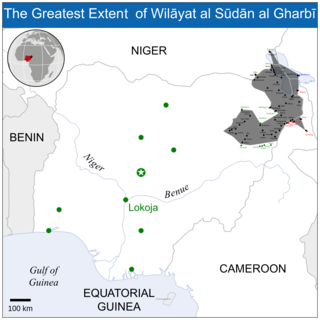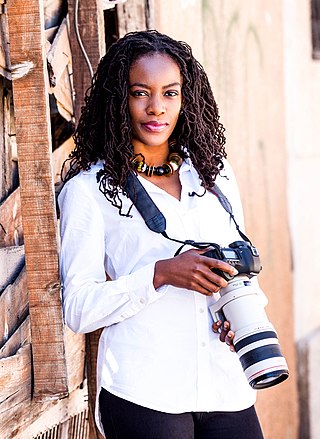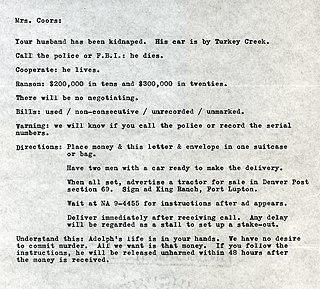Related Research Articles

Boko Haram, officially known as Jamā'at Ahl as-Sunnah lid-Da'wah wa'l-Jihād, is an Islamist militant organization based in northeastern Nigeria, which is also active in Chad, Niger, northern Cameroon, and Mali. Boko Haram was the world's deadliest terror group during part of the mid-2010s according to the Global Terrorism Index. In 2016, the group split, resulting in the emergence of a hostile faction known as the Islamic State's West Africa Province.

Gwoza is a local government area of Borno State, Nigeria. Its headquarters are in the town of Gwoza, a border town "about 135 kilometres South-East of Maiduguri." The postal code of the area is 610.

The Boko Haram insurgency began in July 2009, when the militant Islamist and jihadist rebel group Boko Haram started an armed rebellion against the government of Nigeria. The conflict is taking place within the context of long-standing issues of religious violence between Nigeria's Muslim and Christian communities, and the insurgents' ultimate aim is to establish an Islamic state in the region.

Abu Mohammed Abubakar al-Sheikawi was a Kanuri terrorist who was the leader of Boko Haram, a Nigerian Islamist militant group. He served as deputy leader to the group's founder, Mohammed Yusuf, until Yusuf was executed in 2009.
On 29 September 2013, gunmen from Boko Haram entered the male dormitory in the College of Agriculture in Gujba, Yobe State, Nigeria, killing forty-four students and teachers.
Timeline of the Boko Haram insurgency is the chronology of the Boko Haram insurgency, an ongoing armed conflict between Nigerian Islamist group Boko Haram and the Nigerian government. Boko Haram have carried out many attacks against the military, police and civilians since 2009, mostly in Nigeria. The low-intensity conflict is centred on Borno State. It peaked in the mid 2010s, when Boko Haram extended their insurgency into Cameroon, Chad and Niger.

On the night of 14–15 April 2014, 276 mostly Christian female students aged from 16 to 18 were kidnapped by the Islamic terrorist group Boko Haram from the Government Girls Secondary School at the town of Chibok in Borno State, Nigeria. Prior to the raid, the school had been closed for four weeks due to deteriorating security conditions, but the girls were in attendance in order to take final exams in physics.
On the night of 5-6 May 2014, Boko Haram militants attacked the twin towns of Gamboru and Ngala in Borno State, northeastern Nigeria. About 310 residents were killed in the 12-hour massacre, and the town was largely destroyed.

On the evening of 1 June 2014, an improvised explosive device was set off at a football field in Mubi, Adamawa State, Nigeria. At least 40 people were killed in the attack, according to eyewitnesses. Nineteen others were injured. The perpetrators of the attack were not clear, although media reports generally blamed Boko Haram.
From 20 to 23 June 2014, a series of attacks occurred in Borno State, Nigeria. 91 women and children were kidnapped in the attacks and more than 70 people were killed.

Between 23 and 25 June 2014, a series of attacks occurred in central Nigeria. On 23–24 June, gunmen attacked a number of villages in Kaduna State, killing around 150 people. The attack was blamed on Fulani tribesmen. On 25 June 2014, a bomb exploded at the Emab Plaza in the national capital of Abuja, killing at least 21 people. In response to the bombing, the Nigerian military raided two militants camps on 26 June, killing more than 100 people.
The following lists events from 2014 in Nigeria.

Quasi-state-level jihadist groups, including Boko Haram and the Islamic State of Iraq and the Levant, have captured and enslaved women and children, often for sexual slavery. In 2014 in particular, both groups organised mass kidnappings of large numbers of girls and younger women.

Starting in late January 2015, a coalition of West African troops launched an offensive against the Boko Haram insurgents in Nigeria.

Esther Ibanga is a Nigerian pastor and founder of the "Women Without Walls Initiative". She won the 32nd Niwano Peace Prize for promoting peace among people of different ethnic groups and religions in Jos, Nigeria.

Chikaodinaka Sandra Oduah is a Nigerian-American journalist who has worked as a television news producer, correspondent, writer and photographer. She is currently a correspondent for VICE News. Known for her unique human-focused ethnographic reporting style with an anthropological approach, she was awarded a CNN Multichoice African Journalist Award in 2016. Upon the abduction of 276 schoolgirls by the terrorist group Boko Haram in Chibok, northeastern Nigeria, she was the first international journalist to visit and spend extensive time in the remote community of Chibok. Her thorough and exclusive coverage of the mass kidnapping won her the Trust Women "Journalist of The Year Award" from the Thomson Reuters Foundation in 2014. Oduah's reporting explores culture, history, conflict, human rights, and development to capture the complexities, hopes and everyday realities of Africans and people of African descent.
Amina Ali Nkeki is a Nigerian former hostage of Boko Haram. She was one of 276 female students the group kidnapped from Chibok in 2014. After 57 of the girls escaped in the first few months, the remaining 219 were held for several years. Of this larger group, Ali was the first freed. She was found on 17 May 2016 by Civilian Joint Task Force along with a four-month-old child and an alleged Boko Haram member, Mohammed Hayatu, who described himself as her husband. All three were severely malnourished.
On February 19, 2018, at 5:30 pm, 110 schoolgirls aged 11–19 years old were kidnapped by the Boko Haram terrorist group from the Government Girls' Science and Technical College (GGSTC). Dapchi is located in Bulabulin, Bursari Local Government area of Yobe State, in the northeast part of Nigeria. The federal government of Nigeria deployed the Nigerian Air Force and other security agencies to search for the missing schoolgirls and to hopefully enable their return. The governor of Yobe State, Ibrahim Gaidam, blamed Nigerian Army soldiers for having removed a military checkpoint from the town. Dapchi lies approximately 275 km northwest of Chibok, where over 276 schoolgirls were kidnapped by Boko Haram in 2014.
Glenna Gordon is an American documentary photographer, photojournalist, editor, and educator based in New York City. She is known for documenting such event as the Ebola outbreak, ISIS and Al Qaeda's hostage situations, and the kidnapping of more than two hundred and fifty Nigerian school girls. She is also known for her documentation of Nigerian weddings. Her work has been commissioned by The New York Times Magazine, Time, The Wall Street Journal, and Smithsonian. Gordon is an adjunct professor at the New School in New York City and an editor at Red Hook Editions.

Kidnapping is a major problem in Nigeria in the early 21st century. Kidnapping by bandits and insurgents is among the biggest organised or gang crime in Nigeria and is a national security challenge.
References
- 1 2 Traff, Thea (8 September 2013). "Ruth McDowall in Nigeria". The New Yorker . Retrieved 23 May 2016.
- ↑ McDowall, Ruth. "Malaiku: The Angels". LensCulture . Retrieved 23 May 2016.
- ↑ Okeowo, Alexis (5 October 2015). "The Young Survivors of Boko Haram". The New Yorker . Retrieved 23 May 2016.